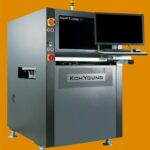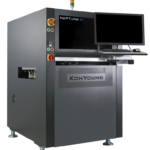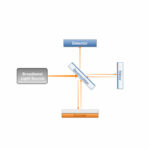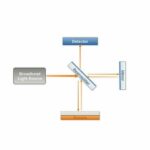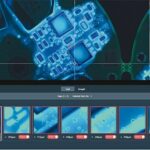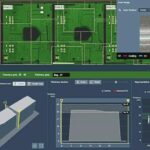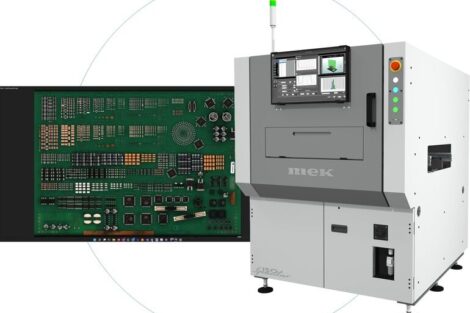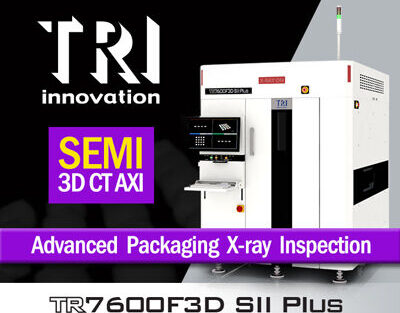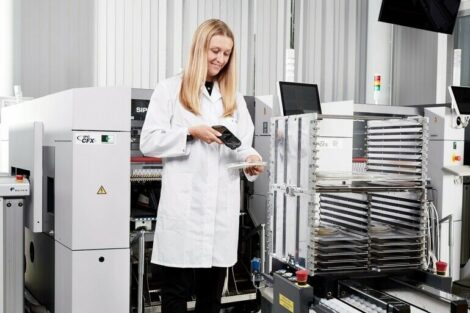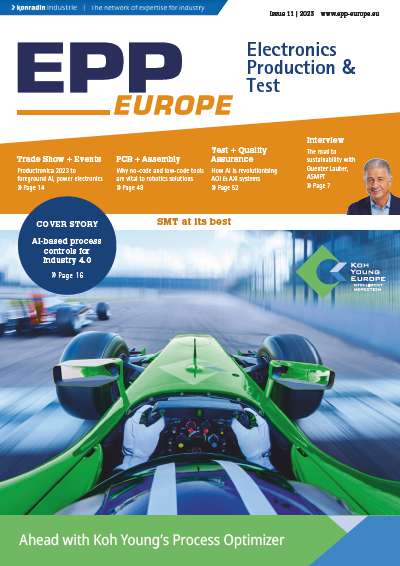A conformal coating is a transparent protective film with a thickness of around 50um applied to a PCB to protect the board and its components from corrosion (caused by vibration, temperature changes, and so on) and from the environment. It is used on parts that need to offer increased product reliability via dustproofing and waterproofing. As conformal coatings significantly reduce the chance of circuit failure due to moisture, they are now being increasingly applied to products which necessitate a high level of reliability. There are various coating methods used today including dipping, brushing, and spraying. Selective spraying methods that only coat a specific area are also being more widely used.
In addition to conformal coatings, various other dispensing technologies such as underfill and overcoating are emerging in the market. Underfill redistributes the thermomechanical stress created by the coefficient of thermal expansion mismatch between the silicon chip and organic substrate and is often applied to BGAs and CSPs in semiconductors or during SMT processes. In some medical applications, a droplet-shaped coating needs to be placed on the pad, in a process known as overcoating, and the height of this droplet needs to be measured. Indeed, as this example makes clear, some dispensing applications now also require specific inspection processes.
3D inspection
Until recently, 2D inspection was all that was required for conformal coating inspection; now however, there is rising demand for 3D inspection. This has come about because it is necessary to ensure the coating attains a particular thickness. If the conformal coating is applied too thinly, the parts that require protection may not be sufficiently shielded. If, on the other hand, the coating is applied too thickly, the unnecessary stress this adds to the board can cause side effects such as bubbles and cracks. IPC recommends a thickness of between 30um and 130um depending on the type of conformal coating. Proper coating thickness is very important to ensure the quality of a board, yet 3D thickness inspection is not easy because the coating itself is transparent.
Biggest inspection challenges
So, what are the biggest challenges when it comes to coating inspection? Conformal coatings are done using different materials meaning that, in some cases, the coating thickness and UV color may be different – even for the same type of board. As conventional 2D CCI (conformal coating inspection) systems inspect according to the UV color, and are susceptible to the board environment, this can lead to a high rate of 2D false calls. In order to solve these problems, it is also necessary to continuously draw and set the region of interest (ROI). Finally, as explained above, because the conformal coating is itself transparent, 3D thickness measurement using existing inspection technology becomes a challenge. In the case of IC components, for instance, we find that, because the coating flows down, it remains thin on top of the leads but relatively thick in between them because it has gathered here.
In the case of underfill, there is a need to check the fillet height using 3D. Accurate measurement is difficult due to the steep slope of the fillet. Although, it looks black, underfill may, in some cases, have some transparency. Before curing especially, it is even more transparent. With a level of transparency like this, there is no guarantee that the 3D shape is of the correct height or not, as the light is slightly transmitted when it is reflected. As such, it is difficult to obtain reliable 3D data with existing CCI technology. Currently, in order to ensure the reliability of 3D measurements, some boards must be destroyed.
The Neptune series
To help overcome these challenges, Koh Young has launched the Neptune series for conformal coating inspection. The tabletop Neptune T and the inline Neptune C+ machine. The tabletop machine is optimized for thickness measurement, and the Neptune C+ is the industry‘s first 3D in-line DPI, (Dispensing Process Inspection) system, which is able to offer both the 2D and 3D inspection of various transparent materials.
In addition to 2D conformal coating inspection, Neptune C+ also provides solutions for various areas that undergo 3D inspection. As explained above, in existing 2D CCI, defects are detected using only the UV brightness color, leading to frequent false calls. Bubble detection is, for instance, an area with a very high false call rate.
In order to minimize this false call rate, Koh Young employs an image-based machine learning-algorithm for bubble detection. First, bubble images from the field are collected, and classified by bubble shape based on the collection of images, in order to continuously enhance the bubble detection engine. The Neptune C+ thus enables customized bubble detection according to bubble classification. For example, some customers may wish to class a bubble that occurs far away from the lead as not defective, while others prefer to classify any bubble – no matter where it is detected – as a defect.
User-friendly software
Programming that was difficult with existing CCI systems has also been made easier by our user-friendly software. The user interface is very intuitive and easy to use. Everything from recipe creation to result review is possible in one piece of software. Drawing the ROI is also very simple using a rectangle, circle, polygon, and so on. After selecting a type of inspection, the user need only to draw an ROI, and the inspection process is ready to go.
Most importantly, Koh Young’s systems provide the most accurate and reliable 3D inspection regardless of the surface condition of transparent materials. Unlike other CCIs, the Neptune can inspect within 3 minutes without any damage to the board. Existing CCI systems normally measure the height by adjusting the position of this reference mirror, but our technology does this by adjusting the frequency. Also, instead of inspecting only one point, our CCI systems deliver tomographic information by area inspection. As such, the image shown above is acquired, and as you can see, multiple layers of fluid structure can be clearly seen.
DPI beyond CCI
Our Neptune C+ can perform 2D and 3D inspection of conformal coatings, as well as 3D inspection of underfills and overcoatings. Currently, it offers a measurement range of 10 microns to 3.5 mm for these transparent materials, in the absence of refraction. Moreover, just to briefly explain the hardware, it has a 12M pixel camera and 15um. There is not much difference in size from the existing SPI and AOI systems, but in the case of the Neptune C+ we also have a flipper-type ready system so there may be some differences in PCB thickness and machine weight.


